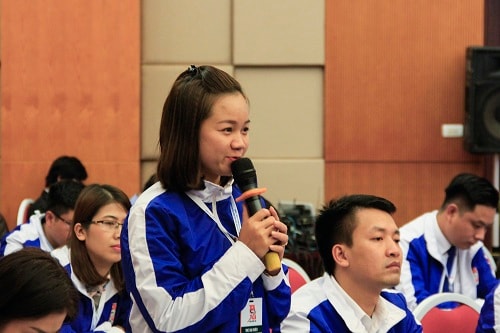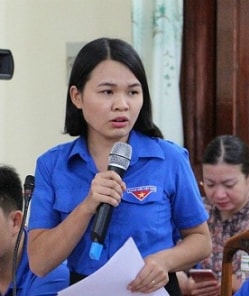Delegates explain why young intellectuals do not want to return home
It's not that young intellectuals don't love their country, but if they return, they won't be able to fully develop their talents and realize their dreams.
In her speech at the forum "Promoting youth creativity, innovative startups" within the framework of the 11th National Youth Union Congress, Ms. Tran Thi Thu, Deputy Secretary of the Quang Tri Provincial Youth Union, pointed out the shortcomings in attracting talent and promoting youth access to the 4.0 industrial revolution.
 |
Delegates attending the 11th National Youth Union Congress shared their proposals and recommendations with eight ministers on the afternoon of December 10. Photo: Duong Tam |
Nowadays, many talented young intellectuals abroad do not want to return home, while young intellectuals in the country often concentrate in big cities and do not want to return to their hometowns to work. According to Ms. Thu, it is not because they do not love their homeland and country, or do not have the spirit of dedication, but because if they return, they will not have enough conditions to fully develop their talents and realize their dreams.
Ms. Thu commented that both national and provincial levels have policies to promote talents, but they mainly stop at the level of direct recruitment into the payroll, financial support, and housing. Once in the payroll, all policies for direct recruits also follow the general policy for civil servants.
To take the exam for a senior specialist, talented people must also have nine years of experience as a specialist. To be appointed to a leadership or management position, they must have an intermediate or advanced degree in political theory, while civil servants cannot take the initiative to study for this degree but must be sent by their agency and are usually ranked according to seniority.
"So, is that policy really attractive to young intellectuals?", Ms. Thu asked, saying that to attract young intellectuals to state agencies, it is necessary to expand policies, not only providing input incentives but also, importantly, incentives in training and use during the working process.
Ms. Thu also proposed not only attracting talents to state agencies but also needing more policies such as investment capital support, tax and land policies... for young intellectuals to start innovative businesses and develop businesses right in their hometown..
Improve the quality of education in business, technology and general information technology
Ms. Thu affirmed that technology, information technology and business education at the secondary level plays an important fundamental role in promoting scientific research, technology and innovative start-up activities among young people. However, the teaching of this content in secondary schools still has many shortcomings..
 |
Ms. Tran Thi Thu, Deputy Secretary of Quang Tri Provincial Youth Union. Photo: Nghe An |
According to the Global Entrepreneurship Monitor - GEM 2015-2016 Global Entrepreneurship Index Report, among 12 indicators on business conditions, the four lowest-ranking indicators of Vietnam are post-secondary business education (47/62), secondary business education (47/62), government support programs (50/62) and business finance (50/62).
The Deputy Secretary of the Quang Tri Provincial Youth Union said that business education at the high school level is currently only integrated with technology or civic education. The number of classes is small, and part-time teachers have absolutely no expertise in economics, so the quality and efficiency are low.
Regarding technology and information technology content, textbooks for these two subjects are slow to be updated and have low applicability. Reference materials for teachers and students, and training for teachers are still limited.
From the above reality, Ms. Thu believes that in order for young people to quickly access the 4.0 industrial revolution, the educational content on business, technology and information technology at the secondary level needs to be innovated in the direction of enhancing their position and role.
Ms. Thu proposed increasing the duration of this content in the general education program; training teachers with economic majors for business education content; building a national online database to support teaching and learning, in which achievements in science and technology and innovative startups must be updated promptly; including basic programming teaching content in the program from primary school (this has been applied in Estonia or the UK)....
| The 11th National Congress of the Youth Union will take place from December 10 to 13 in Hanoi. During six working sessions, 1,000 delegates will evaluate the work of the Youth Union and the youth movement in the past term; determine goals, tasks and solutions for the 2017-2022 term; amend and supplement the Youth Union Charter; and elect the 11th Central Executive Committee of the Youth Union. |
According to VNE
| RELATED NEWS |
|---|
